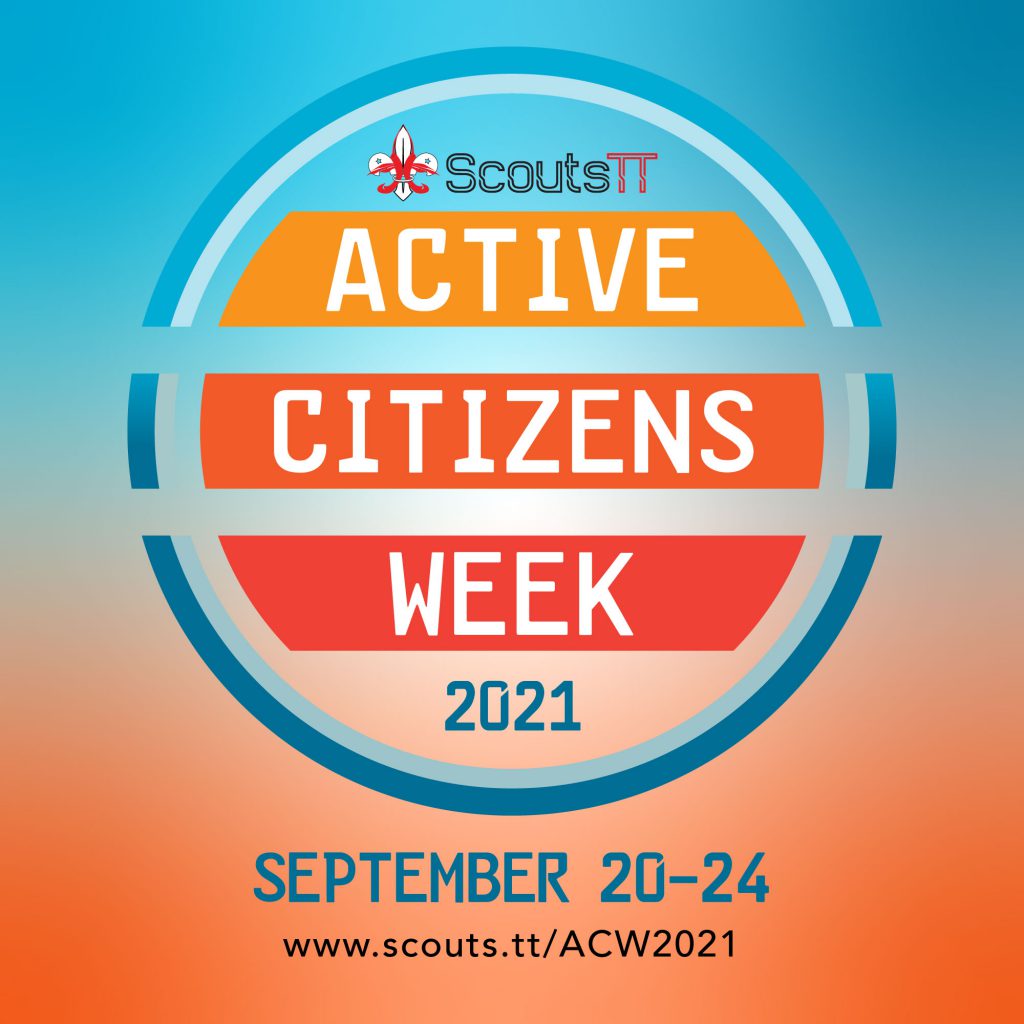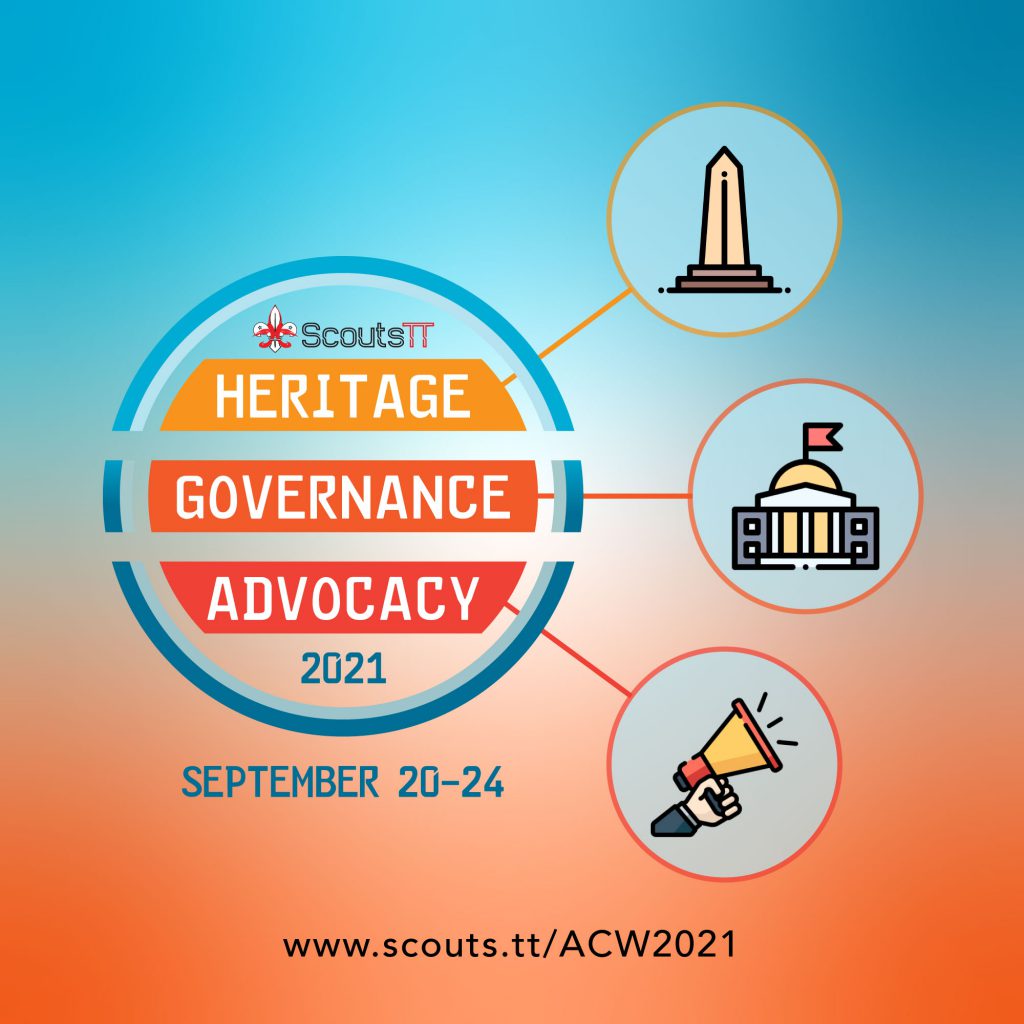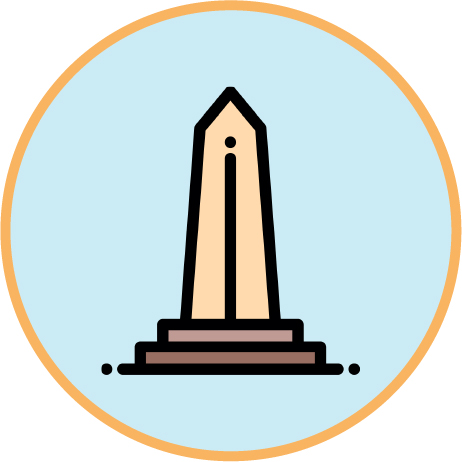ScoutsTT Active Citizens Week 2021

The goal of the Scout Movement is to provide young persons with the opportunity to participate in activities and events that contribute to their growth as active citizens.
What is an active citizen? An active citizen is one that cares enough about their community to change it for the better. To effectively be able to do this they must understand the history and culture of their community, the avenues or methods that exist for them to enact change and be able to identify and understand issues that they are passionate about.
This week of activities is therefore split into three main areas: Heritage, Governance and Advocacy. You are free to work with your leaders, groups or parents to try any, or all of the activities and do them in whichever order you like.
We have also provided instructions for Districts to get involved and become a part of this event.
Remember to share your work with us on social media using the following hashtags – #ScoutsTT #ActiveScoutCitizens #iCareAboutMyCountry.

Heritage

Places
In this activity you need to make a map showing at least three (3) Heritage Sites in your District either by hand or using google maps. You can create a social media post to highlight at least one of the sites which will include a picture of yourself at the site. Be sure to include something interesting that you found out about the history of the site. You can contact your Leader or District commissioner if you are unsure about the boundaries of your district
How can districts get involved?
Districts can publish a list of potential heritage locations that could be found within their boundaries.
Language
Our country has had the benefit of a diverse population with varied ancestry. As a result, we have had quite a few languages influence our sayings and vernacular. Challenge yourself to learn a little about one of the languages of our past, you may even be able to find someone that is able to speak Patois or Bhojpuri. Find some greetings in the languages that you have learnt about as well as some sayings and how you would identify members of your family. Create a short video about all that you have learnt and share it with your group and of course feel free to post it on social media and tag us.
Festivity
Our festivals and national events are very much based on our history and are known for their vibrancy. Examples include: Carnival, Hosay, Ramleela and the Tobago Heritage Festival. Pick one that interests you and research some of the traditional characters that form part of the festival. Once you feel that you know enough, get creative and portray this character using art or drama. Share what you have learnt with members of your groups and districts. You can even work with your parents or guardians post it on social media for others to see.
For all heritage activities you should challenge yourself to research something that you may not have known about before. Come out of your comfort zone and explore our National Heritage. A great resource for these activities is the National Trust of Trinidad and Tobago. (https://nationaltrust.tt/)
Governance

Law Abiding Citizen
- Do you know what a law is?
- Where do we make laws in Trinidad and Tobago?
- What is a constitution and what does it contain?
- Where can you find a copy of the Constitution of the Republic of Trinidad and Tobago?
- Do you know who the people are that can change our laws and constitution?
If you have answered no to any of these questions, for this activity you get to find the answers.
- Find out which constituency you are a part of.
- Find out the name of your member of parliament and look for a picture to match the name.
- Find out what they do in the house of representatives (http://www.ttparliament.org/) and even try to catch a contribution from them on the parliament channel (http://parlview.ttparliament.org/).
- If you’re adventurous, kick things up a notch and find out why we have a senate and who decides the persons that get to be a part of it.
At the end of it all, make a meme (keep it respectful) about some part of your research that you found to be interesting. Share it with your parent and leader before trying to post it publicly.
How can districts get involved?
Plan a virtual meeting in your district with a Member of Parliament. Invite a member of the legal fraternity to answer questions on the law-making process.
Localise it!
Every three years we are supposed to have local government elections. This decides who your local government representative will be and ultimately the people that will make up the council of your city or regional corporation. Spend some time to find out who your local government representative is. Also find a picture of the chairman or mayor for your corporation and figure out who else makes up your local government council. Find out who the CEO of the corporation is and what their job is also. As you move about in your community look for different things that the corporation is responsible for. Take pictures and put together a digital collage to explain what they do. Venture Scouts could use this as an opportunity to look for issues that they would like to have addressed and write letters to their local government representatives about it.
How can districts get involved?
Invite a member of your local government council to meet with your members to explain how the corporation functions and to answer any questions that members may have.
Thank your representative
Being a representative of any kind is a very demanding job and it takes a lot of hard work and determination. Show your appreciation for one of our representatives by writing an email of thanks for something that they have done that you appreciate. It can be something small, such as an initiative that they have started in the community or a contribution they may have made in parliament or in the media. Have your parent or leader read the email and help you send it.
Advocacy

Part of being an active citizen is using your voice to represent causes which you believe to be important. For this section, you should work with your parent or leader to identify an issue that you are passionate about and advocate for the changes that you would like to see. To help, think about the needs that society will have in the next 5 or 10 years or perhaps the challenges that you may face at that time.
How can you advocate?
Your goal should not only be to highlight the issue that you have identified but also to demonstrate the solutions or changes that you would like to see. Social media can be a great tool to share information quickly, but without real actions, no significant change may take place. Think about what your talents are and figure out at least one practical demonstration that you can use to advocate for your issue. Plan your actions with your parent or leader and have fun changing the world.
Here are some sample issues and advocacy plans which you can use, but of course you can come up with your own.
Recycling
- Find out about E-waste and the responsible way to dispose of it. Start a collection from members of your community to show how much we are generating before sending it to the relevant organisations. Share your project with others.
- Over one month, collect and recycle most of the plastic, glass bottles, tins and cartoons used in your home. These can be placed in clear or blue plastic bags, you can even use the plastic bags from the supermarket. (Not Black Bags)
You can drop them off at any I CARE Bin. Pictures could be shared to encourage others. - Encourage your friends, neighbours and family members to recycle by making 5 x 7 posters on recycling. You can give these out while at the same time talking to them about how to recycle.
Deforestation
Find out all you can about Deforestation. What are the causes and effects of deforestation?
Pick a specific cause and identify what you can do to help solve the deforestation problem. Find out who the people are that you need to speak with, and which agency can you get help from?
You can create petitions and make demonstrations to educate people. You could also visit sites where deforestation has happened and show what the effects are.
How can districts get involved?
Districts can host live sessions where advocacy projects can be shared to help raise awareness of the issues.